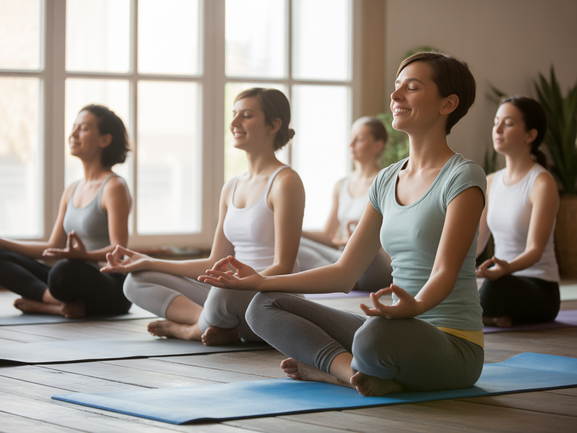Discovering Inner Peace: A Beginner’s Guide to Yoga Spirituality and Philosophy
Starting your yoga journey can feel overwhelming, especially when you hear about its spiritual and philosophical aspects. You might wonder: Do I need to be religious? What does yoga philosophy even mean? Don’t worry – you’re not alone in these questions, and the beautiful truth is that yoga spirituality for beginners is much more accessible than you might think.
In this comprehensive guide, we’ll explore the gentle, welcoming world of yoga philosophy basics and show you how to find inner peace through yoga – regardless of your background, beliefs, or experience level.
What Is Yoga Philosophy? (Simple Explanation)
At its core, yoga philosophy isn’t about complex religious doctrines or mystical concepts. Instead, it’s a practical framework for living a more balanced, peaceful life. The word “yoga” itself means “unity” or “connection” – connecting your mind, body, and spirit.
Think of yoga philosophy as a gentle guide for:
- Understanding yourself better
- Managing stress and anxiety naturally
- Developing mindfulness in daily life
- Creating healthier relationships with yourself and others
- Finding inner calm amid life’s challenges
The beauty of yoga is that it meets you exactly where you are. Whether you’re seeking physical fitness, stress relief, or deeper self-awareness, yoga’s philosophical foundations can enhance your practice without requiring you to abandon your existing beliefs.
Do I Need to Be Religious to Practice Yoga?
This is perhaps the most common concern among beginners, and the answer is a resounding no. While yoga has ancient spiritual roots, modern yoga practice is incredibly inclusive and adaptable to any belief system – or lack thereof.
Yoga spirituality focuses on universal human experiences:
- The desire for peace and happiness
- The need to manage stress and uncertainty
- The wish to feel more connected to ourselves
- The longing for purpose and meaning
Many practitioners find that yoga complements their existing faith, while others approach it purely from a secular, wellness-focused perspective. Both approaches are equally valid and beneficial.
The Spiritual Benefits of Yoga for Beginners
When we talk about the spiritual benefits of yoga, we’re really discussing how this practice can improve your overall well-being and life satisfaction. Research shows that regular yoga practice can:
Reduce Stress and Anxiety
Yoga’s combination of gentle movement, breathing exercises, and mindfulness naturally activates your body’s relaxation response. This helps lower cortisol levels and promotes a sense of calm that extends far beyond your mat.
Enhance Self-Awareness
Through mindful movement and breath work, you’ll develop a deeper understanding of your physical sensations, emotional patterns, and mental habits. This increased self-awareness is the foundation of personal growth and healing.
Improve Emotional Regulation
Regular practice helps you respond to life’s challenges with greater equanimity. Instead of being overwhelmed by difficult emotions, you’ll learn to observe them with compassion and wisdom.
Foster Connection and Community
Despite popular belief, yoga isn’t just about individual practice. Many practitioners find deep fulfillment in connecting with like-minded individuals who share similar values of kindness, acceptance, and growth.
If you’re looking for guided support on this journey, consider exploring Vitalizen’s beginner-friendly programs that gently introduce these concepts through practical, accessible sessions.
Key Concepts Made Simple
Mindfulness
Mindfulness in yoga simply means paying attention to the present moment without judgment. Instead of worrying about tomorrow or rehashing yesterday, you focus on what’s happening right now – your breath, your body, your surroundings.
Self-Compassion
Yoga teaches us to treat ourselves with the same kindness we’d show a good friend. This means accepting our limitations, celebrating small victories, and approaching mistakes as learning opportunities rather than failures.
Non-Attachment
This doesn’t mean becoming emotionally distant. Rather, it’s about holding our goals and expectations lightly, reducing the suffering that comes from clinging too tightly to specific outcomes.
For more insights on incorporating these practices into daily life, check out our comprehensive collection of articles and practical tips.
Practical Tips for Starting Your Spiritual Yoga Journey
Start with Your Breath
Before diving into complex poses or philosophical texts, simply focus on your breathing. Spend 5-10 minutes each day practicing deep, conscious breathing. This alone can provide significant stress relief and mental clarity.
Set Gentle Intentions
Instead of rigid goals, set compassionate intentions for your practice. For example: “I intend to be kind to myself today” or “I intend to notice one moment of beauty.”
Practice Gratitude
End each yoga session by acknowledging three things you’re grateful for. This simple practice rewires your brain for positivity and contentment.
Listen to Your Body
Your body is constantly providing information about your physical and emotional state. Learn to tune in and respond with appropriate care and attention.
Create Sacred Space
You don’t need an elaborate altar or meditation room. Simply designate a quiet corner where you can practice without interruption, perhaps with a candle, plant, or meaningful object.
Ready to begin? Start your transformative journey with Vitalizen’s gentle, beginner-focused sessions designed specifically for those new to yoga’s spiritual dimensions.
Frequently Asked Questions
How long does it take to experience the spiritual benefits of yoga?
Many people notice increased calm and awareness within just a few sessions. However, deeper transformative effects typically develop over weeks or months of consistent practice. Remember, this is a journey, not a destination.
Can I practice yoga spirituality if I’m an atheist or agnostic?
Absolutely! You can approach yoga’s spiritual aspects as psychological and philosophical tools for well-being rather than religious practices. Focus on concepts like mindfulness, self-compassion, and stress reduction.
What if I can’t meditate or quiet my mind?
A busy mind is completely normal, especially for beginners! The goal isn’t to stop thinking but to observe your thoughts without getting caught up in them. Start with just 2-3 minutes of quiet sitting and gradually increase as it becomes more comfortable.
Do I need special equipment or clothing for spiritual yoga practice?
Not at all! While yoga props can be helpful, you can start with just a quiet space and comfortable clothing. The most important “equipment” is your willingness to explore and be patient with yourself.
How do I know if I’m progressing in my spiritual yoga journey?
Progress might look like: feeling calmer in stressful situations, being more compassionate with yourself, sleeping better, or simply enjoying moments of peace during your day. Trust that even small shifts are meaningful.

